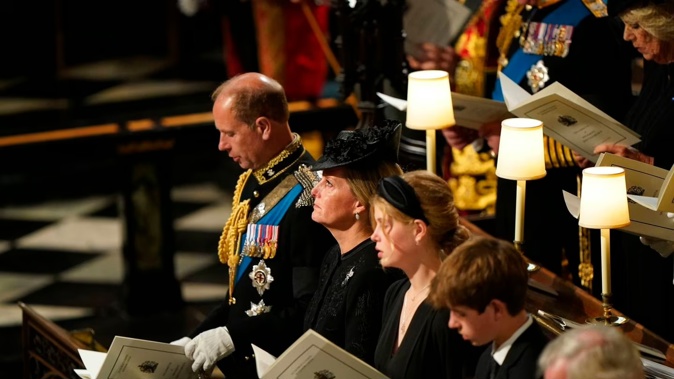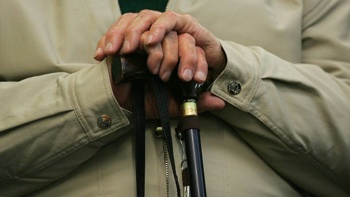
No royal watchers were surprised when King Charles made his brother, Prince Edward, the new Duke of Edinburgh on Friday night.
The role had long been promised for him by his late parents, Queen Elizabeth II and Prince Philip, who was the last royal to hold the respected Dukedom.
Edward made no secret of his ambition to one day follow in his father’s large footsteps and took over many of his responsibilities when he died aged 99 in 2021, including helping to run the Duke of Edinburgh award.
/cloudfront-ap-southeast-2.images.arcpublishing.com/nzme/BDZ3N62NWNBSTBS2ST43UJMHKM.jpg) Prince Edward is now Duke of Edinburgh, taking over his late father Prince Philip's title. Photo / Getty Images
Prince Edward is now Duke of Edinburgh, taking over his late father Prince Philip's title. Photo / Getty Images
And it’s hardly surprising that Charles wanted to elevate Edward’s wife Sophie, regarded by some as the late Queen’s closest confidante, to the senior royal role of the Duchess of Edinburgh now Prince Harry and Meghan Markle are out of the picture.
But promoting Edward to a new role raised the question of who would replace him as the new Earl of Wessex.
And in answering that question, Charles may have made a mistake.
Taking Edward’s place as the Earl of Wessex is his 15-year-old son, James, Viscount Severn.
His older sister, Lady Louise Windsor, will not take up a new role.
Under the ancient rules of primogeniture, courtesy titles are only passed to the former holder’s eldest living son - in this case, James.
- Prince Harry contacted about coronation; attendance unclear
- Kate Hawkesby: Harry and Meghan have brought this all on themselves and only have each other to blame
Lady Louise, 19, is studying English at St Andrews University and may not have even wanted to become the Countess of Wessex - the female equivalent of an earl.
But given the steps Charles and other senior members of the Royal Family have made to modernise what can be at times an archaic institution, snubbing Lady Louise comes across as a backwards step.
After all, Charles and Queen Elizabeth II were both in favour of the Succession to the Crown Act of 2013 - a historic change in law that meant younger sons would no longer displace elder daughters in the line of succession.
The law came into force when the Princess of Wales was pregnant with her first child, who turned out to be a boy, Prince George.
Their second-born child, Princess Charlotte, is third in line to the throne, behind her father William and George and ahead of her younger brother, Prince Louis.
If the law had not been changed, she would have fallen behind Louis in the line of succession after his birth.
However, the Succession to the Crown Act only applies to royals born after October 28, 2011, and was not backdated.
This is why Lady Louise is behind her brother James in the line of succession, despite efforts to equalise men’s and women’s standing in the royal family.
/cloudfront-ap-southeast-2.images.arcpublishing.com/nzme/PUPHLXVOSFABNFSCZJW4KQJS4I.jpg) It's the latest in a slew of title changes in the royal family made by King Charles. Photo / AP
It's the latest in a slew of title changes in the royal family made by King Charles. Photo / AP
And it plays into why James has been handed the earldom, rather than his older sister.
Given Charles decided to delay making Edward the new Duke of Edinburgh - despite the promise made to Edward by the late Queen and Prince Philip on his wedding day back in 1999 - it’s not beyond the realm of possibility that he could have decided to step in and hand Lady Louise the peerage instead of James.
The move to hand Edward the Dukedom is not what might have been expected from Charles, who has made great efforts to slim down the monarchy.
The King is understood to have been concerned about such a senior title being conferred to Edward given he is now 13th in line to the throne, and will only slip further down as the younger royals start their own families in years to come.
Edward himself has hinted at his preference for a more modern monarchy, with the new Duke himself eschewing a Dukedom when he married Sophie and choosing to be made an earl instead.
Traditionally, the sons of monarchs are handed a Dukedom when they get married, and there had been suggestions he could be made the Duke of Cambridge or Sussex, titles that later passed to Princes William and Harry.
The title of earl is usually given to commoners who marry into the royal family.
There was even a suggestion that Edward chose the Earldom of Wessex after watching Shakespeare in Love, in which a dashing Colin Firth plays Lord Wessex.
Edward and Sophie also decided that their children would not be given the style His or Her Royal Highness, “but would have courtesy titles as sons or daughters of an earl”.
The decision reflects “the clear personal wish of Prince Edward and Miss Rhys-Jones as being appropriate to the likely future circumstances of their children”, a spokeswoman said ahead of the wedding in 1999.
/cloudfront-ap-southeast-2.images.arcpublishing.com/nzme/DKCDMQO47BGVNASVLAYTZBLELU.jpg) The new Duke of Edinburgh and Sophie, Countess of Wessex. Photo / AP
The new Duke of Edinburgh and Sophie, Countess of Wessex. Photo / AP
James will not become the Duke of Edinburgh when his father dies, with that title reverting to the Crown, but his title will change ever so slightly from the Earl of Wessex to the Earl of Wessex and Forfar.
It is rumoured that the Duke of Edinburgh title will one day pass to one of William’s sons, likely Louis, later in life.
A Buckingham Palace statement on Friday said: “His Majesty The King has been pleased to confer the Dukedom of Edinburgh upon The Prince Edward, Earl of Wessex and Forfar, on the occasion of His Royal Highness’s 59th birthday.
“The title will be held by Prince Edward for His Royal Highness’s lifetime.
“The Dukedom was last created for Prince Philip in 1947, upon his marriage to Princess Elizabeth, who held the title of Duchess of Edinburgh before acceding to the throne in 1952.
“The new Duke and Duchess of Edinburgh are proud to continue Prince Philip’s legacy of promoting opportunities for young people of all backgrounds to reach their full potential.”
/cloudfront-ap-southeast-2.images.arcpublishing.com/nzme/ADEC3D7XXRAZ5JKUUL6Y6WNMYM.jpg) Lady Louise Windsor has missed out on a title change despite her father and brother's new roles. Photo / AP
Lady Louise Windsor has missed out on a title change despite her father and brother's new roles. Photo / AP
The Dukedom has previously been created four times for members of the royal family.
The first Duke of Edinburgh was Prince Frederick, the eldest son of King George II, who was handed the title in 1726.
King George III’s brother, William, then held the Dukedom from 1764.
Prince Alfred, the son of Queen Victoria, was handed the Dukedom in 1866, and Prince Philip was made the Duke of Edinburgh upon his marriage to the late Queen Elizabeth II.
The news comes after Harry and Meghan announced that their children Archie and Lilibet would be referred to as Prince and Princess.
A spokesman for the Sussexes said: “The children’s titles have been a birthright since their grandfather became monarch.
“This matter has been settled for some time in alignment with Buckingham Palace.”
Archie and Lilibet’s titles were finally changed on the royal website on Thursday evening - some six months on from the Queen’s death.
They were being referred to as Master Archie Mountbatten-Windsor and Miss Lilibet Mountbatten-Windsor. They are now listed as Prince Archie of Sussex and Princess Lilibet of Sussex.
William and Kate’s titles - and those of their children - were swiftly changed from the Duke and Duchess of Cambridge to the Prince and Princess of Wales after Charles ascended to the throne.
Under rules set out by King George V in 1917, the children of the son of a sovereign are automatically prince and princess.
That meant that Archie and Lilibet were not due to become prince and princess until their grandfather Charles became king.
But Meghan bizarrely claimed during the couple’s infamous interview with Oprah Winfrey that Archie - who was born during Queen Elizabeth II’s reign - was not given a title because of his race.
-Ollie Gillman, news.com.au
Take your Radio, Podcasts and Music with you









